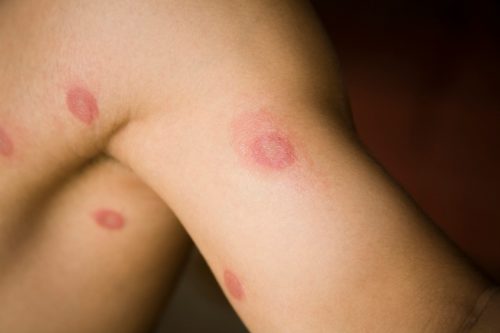New "Highly Contagious" Skin Infection Is Spreading, CDC Warns—How to Stay Safe
This ringworm is likely to be resistant to normal types of treatment.

From allergies to hot weather, there are plenty of innocuous causes to red, irritated patches that sometimes appear on our body. Despite being itchy and painful, most of the rashes we face are harmless and fairly common. Some, however, require more serious intervention, and the Centers for Disease Control and Prevention (CDC) is sounding the alarm about a new skin infection that has just been identified in the country. In fact, this "highly contagious" rash is especially alarming because of how difficult it is to treat. Read on to learn the latest about drug-resistant ringworm, and how the CDC says you can stay safe.
READ THIS NEXT: Deadly Fungal Infection Is Spreading Rapidly, CDC Says—These Are the Risk Factors.
The CDC has identified a new skin infection in the U.S.

A newly discovered health hazard in the country is already causing concern. In a Morbidity and Mortality Weekly Report (MMWR) released May 12, the CDC confirmed that a "highly contagious," drug-resistant ringworm has been detected in the U.S.
According to the report, a New York City dermatologist notified public health officials in February about two cases of patients who had severe tinea—also known as ringworm—that did not clear up from normal anti-fungal treatments.
The CDC said it believes the two patients are not linked. The first woman developed a "widespread pruritic eruption" in summer 2021, with U.S. dermatologist discovering "large, annular, scaly, pruritic plaques over [her] neck, abdomen, pubic region, and buttocks" regions.
Meanwhile, the other woman developed her ringworm rash in summer 2022 while traveling abroad in Bangladesh.
Officials say this ringworm is likely already spreading in the country.

These two ringworm cases were caused by a relatively new species of ringworm fungus called Trichophyton indotineae, according to the CDC. Infections from this drug-resistant ringworm have been seen spreading recently in South Asia over the past decade—likely "driven by misuse and overuse of topical antifungals and corticosteroids," the agency says.
But this is the first time the skin infection has been discovered in the U.S. And since the first patient had no history of travel in other countries where cases have been located, officials believe that this ringworm is likely already spreading across the country.
"It may also be a little more widespread than we have noted before, so for physicians and other providers, I think it's important to be aware that we may be seeing more of this particular species as we go into the warmer, moist summer months," Priya Soni, MD, a pediatric infectious disease specialist at Cedars-Sinai Medical Center in Los Angeles, told CNN.
Soni added, "I think with globalization and just the travel that we're going to see over the summer, this may be something that we may see more of as the months go on."
RELATED: For more up-to-date information, sign up for our daily newsletter.
Anyone can be at risk of getting ringworm.

Despite just two cases being identified so far, you should be on alert about this new skin infection. No matter the fungus responsible, "ringworm is very common," the CDC warns.
But Trichophyton indotineae infections are especially "highly transmissible and characterized by widespread, inflamed, pruritic plaques on the body (tinea corporis), the crural fold, pubic region, and adjacent thigh (tinea cruris), or the face," according to the agency.
Anyone can be at risk of developing this highly-contagious ringworm, but those who have weakened immune systems are more likely to get infected and face issues fighting off their infection.
"People who use public showers or locker rooms, athletes (particularly those who are involved in contact sports such as wrestling), who wear tight shoes and have excessive sweating, and people who have close contact with animals may also be more likely to come in contact with the fungi that cause ringworm," the CDC says.
There are steps you can take to prevent an infection.

According to the CDC, there are several things you can do to prevent developing ringworm. This includes keeping your skin clean and dry, wearing shoes that allow for air-circulation around your feet, regularly cleaning and clipping your nails, and changing your socks and underwear at least once every day.
The CDC also advises reducing potential fungus spread from person to person in certain environments.
"Any kind of ringworm really flourishes in the warm, moist weather, especially in locker rooms, indoor pools, that kind of thing," Soni told CNN. With that in mind, the CDC recommends that you don't walk barefoot in public locker rooms or showers. You should also not share clothing, towels, sheets, or other personal items with someone who may have ringworm, according to the agency.
Best Life offers the most up-to-date information from top experts, new research, and health agencies, but our content is not meant to be a substitute for professional guidance. When it comes to the medication you're taking or any other health questions you have, always consult your healthcare provider directly.





















